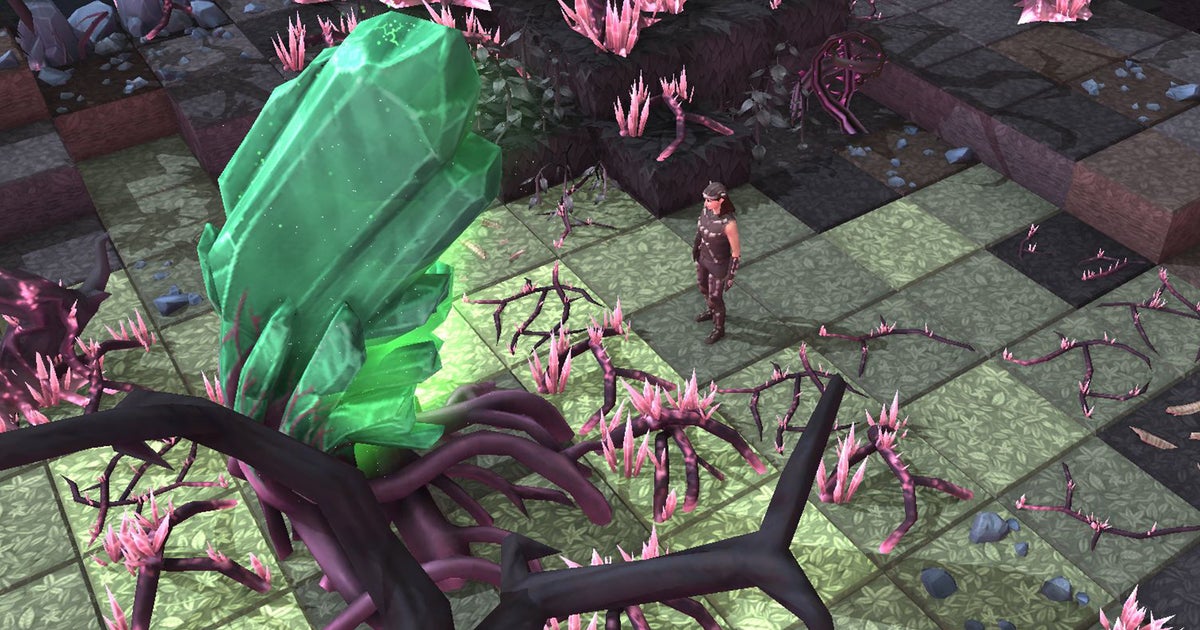I never want to discover exactly how much of my life has been spent grinding for experience points. Even discounting all the hours spent training Pokémon, it’s still going to be an uncomfortably large number thanks to my 18-year investment in RuneScape. Technically, I could find out at least how much time, down to the minute, I’ve spent in Gielinor by talking to an NPC called Hans. I don’t talk to Hans. I’ve long accepted that RuneScape is more of a life choice rather than a video game.
It’s thanks to this life choice (and a genuine love of the game, too) that I’m so excited about Brighter Shores, another MMORPG that’s currently in early access. Why? Well, its developer Fen Research was founded by Andrew Gower, who also co-created RuneScape with his two brothers. At a passing glance, Brighter Shores looks awfully similar to RuneScape. It has a high fantasy setting, a lot of the game is focused on grinding for XP, and even the graphics have an RS3 touch to them. So I was curious to see exactly how reminiscent this new MMO was.
The first thing that caught my attention was the portrayal of its world – and I’m not talking about the graphics. Rather than having an open landscape for you to traverse, the world of Brighter Shores is divided into a series of main locations, which are then constructed out of a collection of individual spaces, be it a town square, thief-infested alleyway or forest meadow. You travel through them one-by-one, and while this may sound restrictive, it actually feels like you’re exploring vignettes of this world, and filling in the map piece by piece, room by room. There’s always an element of mystery when you reach a new location, as it’s impossible to say what size the next area will be, or what it could hold. Will it be a collection of useful resources or a bloodthirsty creature?
Luckily, the map keeps track of both these possibilities as you’re able to record any enemy and resource, including their required level, every time you enter a new vignette through the power of ‘Discover’. This can become a little tedious after a while, especially when you’re ‘Discovering’ the same tree for the third time. But it pays off in usefulness, as even this kind of basic information is listed alongside where each enemy or resource sits within the menu for its dedicated Profession (Brighter Shores’ term for skills) – and that includes the ability to pull that location up on your map. Combined, it ensures you never get lost in the woods trying to remember where you saw those leeks for the pie recipe you just unlocked. Instead, it can be an XP grind all the way down.
Brighter Shores’ locations are also tightly intertwined with its main storyline, which opens with you becoming a guard in the town of Hopeport. The main plot is told through a series of episodes, with each one taking place in a specific location. You also need to complete an episode before you can venture further into the world, meaning you can’t, for example, visit Hopeforest before you’ve completed Hopeport’s episode. Having played through the first two episodes so far, I can’t say I’ve been wholly won over by the story of Brighter Shores so far. It’s very much the standard fantasy affair of ‘Someone’s doing something with magic they shouldn’t be touching.’ I’m still very much in the opening act, though, so I’m hopeful there will be juicier elements waiting around the corner in future updates.
What’s more interesting (and maybe also slightly flawed about Brighter Shores) is how the locations affect your Professions, which is the real meat of the game, after all. These are also tied to specific locations, so if you fancy going fishing, for example, you must be in Hopeport since that’s currently the only place where this Profession can be conducted. I get that this was probably designed to encourage players to train up the new Professions they get when starting a new episode, but I found it steals some of the world’s grandeur. Instead of seeking out new training spots across the globe, you’re simply rotating between the same areas over and over again. Just unlocked a new eel breed? Well, it’s time to visit Eel Street Bridge again. (Yes, that is its name. Hopeport citizens say it like it is.)
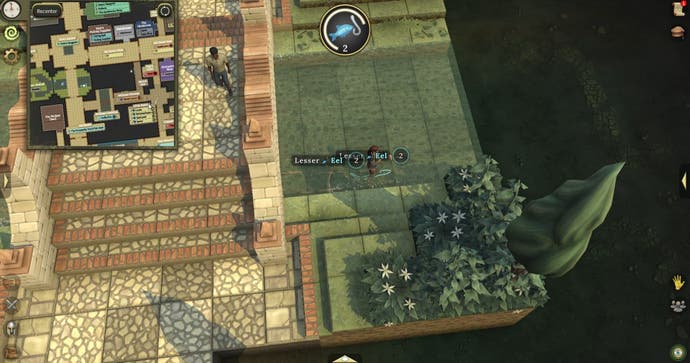
Thankfully, some Professions do add more breadth to the world – while they may be tied to certain episodes, the resources required to get the most out of them don’t always follow the same rule. The Alchemist Profession, for example, can only be trained in one specific Hopeport shop, but certain ingredients can only be found in Hopeforest so, if you want to make those potions, you need to venture further afield and train an additional Profession to acquire them. Likewise with the Woodcutter, which provides the resources you need to train as a Carpenter. This interconnectivity prevents each skill from feeling like a standalone activity. If you’re training one, then you’re most likely going to end up training another. It’s an act which doesn’t quite fix the absence of feeling like you’ve embarked on a grand quest, but it does lay the foundations for what’s (hopefully) to come, and that’s a good achievement for an early access MMO to fulfil.
Of course, take one look at the Professions themselves, and anyone who’s played an inch of RuneScape is going to get déjà vu at first. Several traditional skills are here, but they’ve just been renamed – Chef (Cooking), Fisher (Fishing), Woodcutter (Woodcutting), Alchemist (Herblore), Miner (Mining) and Leatherwork (Crafting). Really, we’re just missing Firemaking and then we’d have the complete set. Mechanically, these Professions are quite similar to their RuneScape counterparts, too, though there is one notable exception in the form of Alchemist, which I’ve found to be a vast improvement over RuneScape’s fiddly Herblore skill thanks to the way it streamlines a lot of that skill’s busywork and general item management.
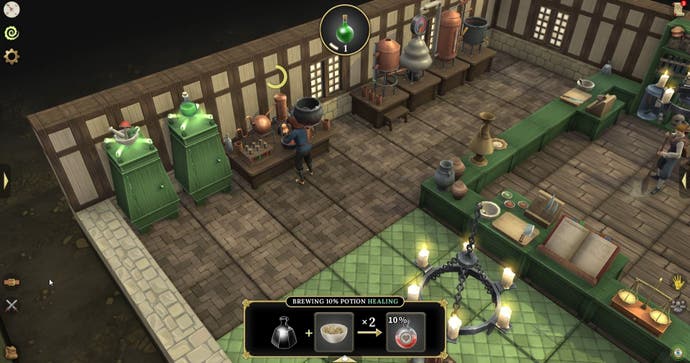
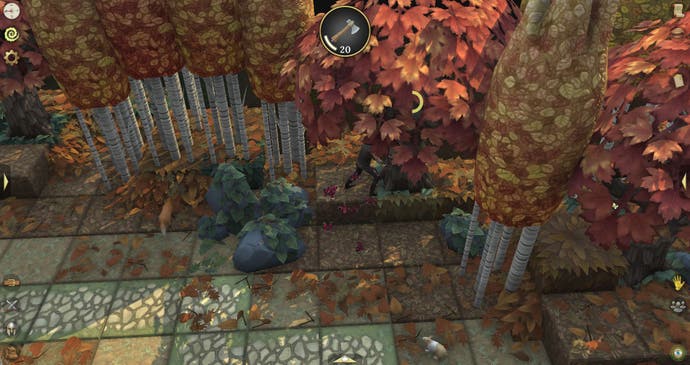
That’s not to say that every Profession in Brighter Shores is simply a reworked RuneScape skill. There are new creations here, too. Forager and Gatherer may literally be the same Profession wearing a different hat, but they’re fundamental to progressing other Professions, especially if you don’t want to spend your in-game money on resources. The Detective Profession, meanwhile, challenges you to fight crime on the mean streets of Crenopolis by raiding crime dens and protecting merchant stalls (though it does also require a Brighter Shores membership in order to unlock it at the moment).
What truly differentiates Brighter Shores from RuneScape in the Professions department, though, is how each episode and, therefore location, has its own combat skills where you always begin at level one. It’s a decision that may sound strange on the surface, but in practice ensures combat is always challenging whenever you begin a new episode, as it’s impossible to enter over-levelled. Just because you’re a Level 30 Guard in Hopeport doesn’t mean your prowess will transfer over to the Scout combat Profession in Hopeforest, for example. If you truly want to become a dangerous combatant there, you’ll need to start defeating as many enemies as you can once again. It certainly keeps things lively, though the need to gather a whole new set of equipment and weapons in the process (as your current equipment will always be weaker outside of their dedicated episodes) means I’ve also been drowning in weapons and armour so far. Instead, I have to resort to the ‘Auto-Equip’ function in my equipment / weapons bank, which you can thankfully access anywhere, simply to avoid wasting any more goblin-killing-time.
Combat itself is your standard point-and-click affair, with the ability to switch between three equipped weapons mid-fight (two melee, one ranged typically). Ostensibly this is to make it slightly more interactive, but I still spent most of my battles sitting back while watching my avatar hit foes with a truncheon until they died. Instead, the main thing Brighter Shores uses to try liven up its combat is its Faction system. There are three to choose from – Cryoknight, Guardian and Hammermage – and you must pick one, with that choice being permanent (handy, then, that there are three character slots, so you can have one character per Faction if you so choose). Essentially, though, this is the ‘RuneScape combat triangle in disguise’, and on the whole, it never felt like my choice of Guardian was ever that meaningful. This Faction is meant to be focused around range combat, but there I was, bashing enemies to death with a heavy piece of wood. Hopefully, the Factions will develop alongside future updates, especially when its planned PvP comes along with its 1.0 release.
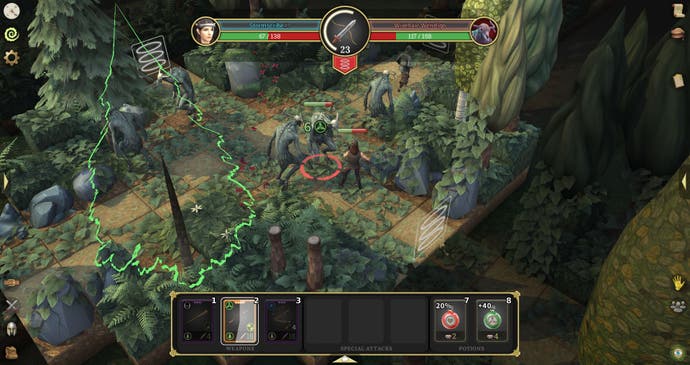
Right now, I’m longing for something a little more in-depth, though Brighter Shores’ Knowledge Points do go some way to adding some welcome complexity to its current system. These are unlocked when you reach Level 20 in a Profession for the first time, and from that point onwards, any time you earn any XP, you’ll also gain progress towards your next Knowledge Point. These can then be exchanged for money, more XP in any skill you’re Level 20 or above in, or the option to unlock a passive training method if you’re at the right level. The latter are incredibly useful, as they allow you to earn XP when logged out of Brighter Shores. Now I can hear you saying, ‘Lottie, how is it good that this MMO has an option where you can get away with not playing?’ Let me explain.
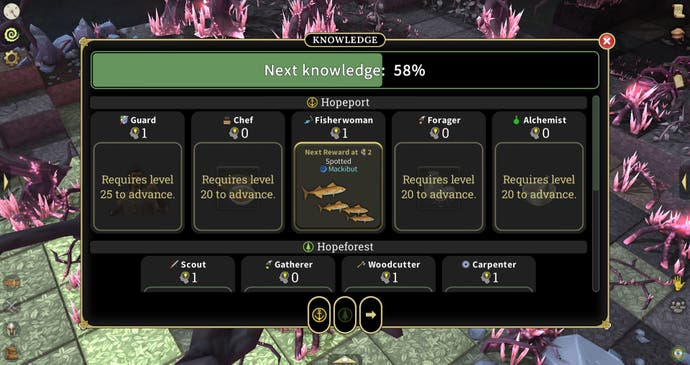
Firstly, many of the passive training methods require a specific item before you can use them, which can either be purchased or earned by using a Profession. How many of these items you have in your inventory determines how long the passive training will last while you’re logged off; fishing, for example, requires bait with each bucket equalling roughly an hour of training. This gives the system a nice balance, since you need the coin or the required Profession level, often quite high, to get the item for free. And let’s not forget about your inventory limit either. Thanks to this, you can’t just log off for two weeks and return to find yourself a Level 100 Fisher.
Secondly, the moment you hit Level 20, the amount of XP required to reach Level 21 rises considerably compared to the ones before it. To be exact, you need 3,462 XP to go from Level 19 to 20 in any Profession, but 17,818 XP to go from Level 20 to 21. Yes, that’s an increase of over 9,000. Since the maximum level for any Profession is 500, you can imagine what the required XP starts to look like in those upper tiers. For this reason, passive training methods are perfect for casual players who still want to enjoy Brighter Shores, but lack the proper time to dedicate to it. Maybe they want to enjoy the side quests, which offer good rewards but have high level requirements, or maybe they’re married to another MMO… (it could happen to anyone). Either way, passive training is a brilliant addition in my books. It feels very fair in its current form, as you still have to put in the work before you can fully utilise it.
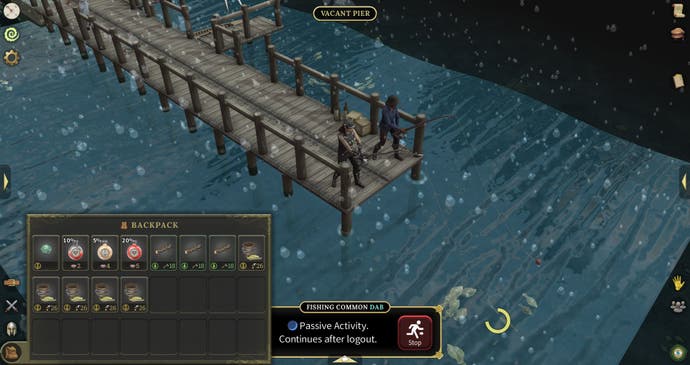
That said, as much as I’ve been enjoying Brighter Shores, my wider feelings on it are more conflicted. It’s had a promising start in early access – a great accomplishment for a small development team – but its RuneScape roots break through the soil a little too strongly at times. Effort has certainly been made to fix some of the issues RuneScape continues to have, but some solutions only cause more problems. Having separate banks for each of your resources, for example, is a great idea on paper, but unless you’ve completed a certain side quest, you’ll have to visit their individual locations scattered across the maps to access them. The high XP requirements for the later levels also means you either need to make sure you’ve set up a passive training method every time you log out or are prepared to invest an awful lot of time into it. For me, it’s the storylines that push much of my XP grind, and in that area Brighter Shores is a little lacking right now. Whereas RuneScape is an active life choice, I fear Brighter Shores will only ever be a very casual video game for me.
